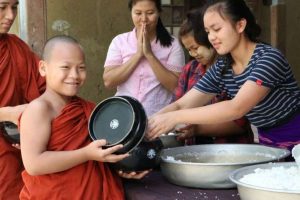Writer Christine Arpita works closely with Pema Choling to improve the lives and opportunities of nuns in Bhutan.
It is 4:45 a.m. and the bell sounds for morning practice in the temple area. Everyone goes quietly, slipping off their footwear before they enter. It is as cold inside as it is out, but they settle in their places and prepare for their prayers and practice. Wafts of incense mix with the sweet smell of the butterlamps on the altar; a warm flickering glow illuminating the room. Dawn breaks while they practice together and slowly the room fills with morning light – a new day.
In the Bumthang region of Bhutan, ordinary Bhutanese women with extraordinary aspirations come from across the country for an unprecedented opportunity. Grateful and dedicated, they live and study in a new facility for girls and women in order to become the nuns (anims) of Pema Choling Institute.
Some have never attended school so there is basic education in language, math, geography, and history. But, what makes Pema Choling unique is its traditional nine-year curriculum of Buddhist Dharma Philosophy that spans from elementary to Master’s degree level, available to women for the first time in the history of Bhutan.
Many Bhutanese women have hard lives and are bound by cultural limitations, which do not encourage or provide education for them. Most of the students come from impoverished subsistence farming families, and may endure social hardship as a result of their resolve to leave their villages and move beyond familial expectations. Most of the 130 nuns are between 16 to 30 years of age, although a few are as young as 13 and as old as 60. Daily routines start before 5 a.m. and finish after 8 p.m., six days a week.
Cooking is a blessing – it is a joy to provide food, and in winter the cooking fire is warm. The nuns in charge have returned to the kitchen from the stream with more buckets of water needed to prepare the morning meal. The fire is stoked and the rice cooks. Once spring comes, the ice will thaw and water will run through the pipes making the task of cooking much simpler.
Pema Choling Institute is part of a lineage that dates back to Bhutan’s “patron saint” Pema Lingpa and earlier to Padmasambhava, who brought Dharma teachings into the Himalayas from India in the 9th century.
Pema Lingpa was born in Bumthang’s Tang valley in the 15th century. He was one of the Five Terton Kings prophesized by Padmasambhava. It is here, in the Tang valley, that Gangteng Tulku Rinpoche, ninth body incarnation of the Pema Lingpa lineage, established the Institute. Eight women were the first graduates in the class of 2011. Five of them are now teachers to students in the lower classes, and three are pursuing further studies in Sanskrit and traditional medicine.
In the year 2000, Rinzi was one of several determined women who gathered at Gangtey, the seat of the Pema Lingpa lineage in central Bhutan. Thankful for the opportunity to study Dharma, she and other nuns lived in a cold, run-down cottage, packed together day and night. Rinzi worked to support herself, and began basic studies. In 2002, the nuns moved to the Tang valley when land became available for the Institute. For three years they lived in temporary buildings sheathed with plastic and newspaper. When construction of permanent facilities commenced in 2005, the nuns made bricks by hand and helped with carpentry. Now, after years of diligence, Rinzi is one of the first women in her country to be qualified to teach Buddhist studies.
The Institute buildings have beautiful Bhutanese architecture richly decorated with colorful symbols and motifs of local Buddhist significance. A central courtyard is surrounded by the living quarters, where nuns comfortably share, three to five to a room. There is space for lessons, prayers and group practice.
With every passing year there is progress with the construction and development of the Institute. Intermittent power exists now with the recent arrival of electricity and solar panels are considered in future to help offset the power costs. Water catchment systems for garden irrigation, future computer lab when power is stabilized, and a library available to members of the surrounding communities are all plans in development.
What the anims long for the most is the completion of the multi-purpose hall and Lhakang. This large structure is an important priority because it will be the heart of the Institute, serving as a large hall for students and community to gather together for special events. It will also house the main shrine with the symbolic elements and art, which act as support for study and meditation.
Priorities have to be balanced however, as basic needs, educational supplies, and maintenance are all daily necessities. Quality and availability of nutritious food is an issue not only for Pema Choling, but also other monastic communities in Bhutan. Throughout the year this remains a challenge due to limited seasonal food resources.
The anims quietly line up by the kitchen with their bowls. As usual, the meal is a simple one: rice and chilies with onions. It will be the same at midday and evening meals; the same for the coming days and weeks. With gratitude, each goes to her room to eat. They do not eat any meat or eggs, and vegetables are not available in the cold months. Eventually the garden soil will be warm enough to work and they will tend the land and enjoy a variety of vegetables during the short growing season.
For now, Pema Choling Institute is supported by international charities in Europe, the United States, and Canada as ongoing funds are vital for the progress of development. Eventually self-reliance can be strengthened through vocational training in religious art. Not only will the nuns learn the intricacies and importance of Vajrayana (Tibetan-style Buddhism) symbolism, but also income may be generated from the creative efforts.
A Guest House is planned as part of the long-term goal of Pema Choling to become a center for women from all across the Himalayas and beyond to other countries – a place for learning, for meditation, and retreat.
Many circumstances, both locally and globally, must come together to achieve their goals. There are many challenges. For example, it is difficult to get seasoned wood for construction, and securing skilled labor is limited since the local people need to work their own land. Finding financial resources is always a challenge in order to continue with the valuable development progress already made. These anims must rely on the generosity of others to accomplish these important goals.
Two women go to the forest to gather wood for the cooking fire. Everyone is equal, so they take turns with such chores. They gather wood from the forest floor and cut dead branches from the trees. Wood is dragged back to the Institute and then cut into pieces small enough to stack.
During afternoon tea break, anims linger around the cooking fire to sip hot buttery tea and talk together. Even in lighter moments, sprinkled with laughter, their demeanor is discreet and peaceful.
Bhutan is changing. A cellular telephone network is already well underway throughout the country. With this, the Internet and a flood of new ideas and mixed messages from the world media are becoming accessible to remote areas. In the center of this changing Bhutanese fabric is the Buddhist view. Empowering women to take a place of leadership in their communities will have lasting effects. With time, more women will become role models for others; they will be able to respond to the changing conditions and help their country adjust to the 21st century.
“Women who study can bring benefit to the country of Bhutan and serve sentient beings everywhere. Legally, nuns and lay women in Bhutan have equal rights. But because of traditional habits, women do not have much education. Because of this, they are less courageous and suffer from a lack of self-esteem. Although women seem to be stronger than men, a lack of education equals a lack of resolve. A courageous approach is necessary. Study and teachings will allow them to look directly at life, without hesitation.”—Gangteng Tulku Rinpoche
For further information, see:
Pema Choling (USA)
Pema Choling (Canada)














